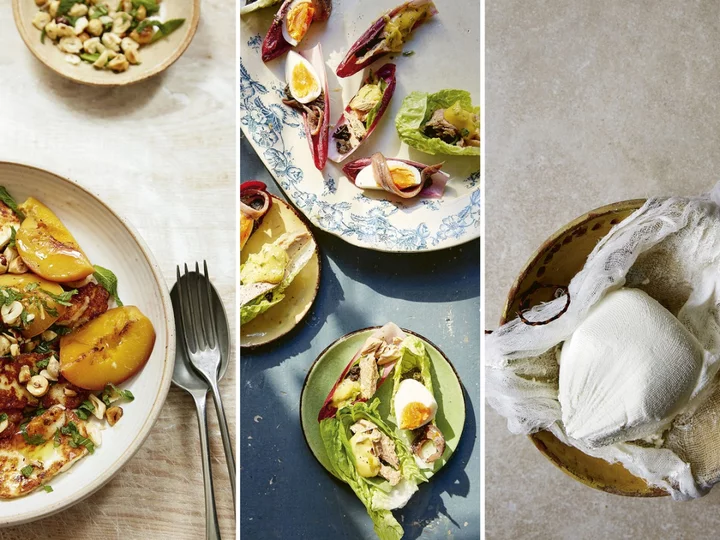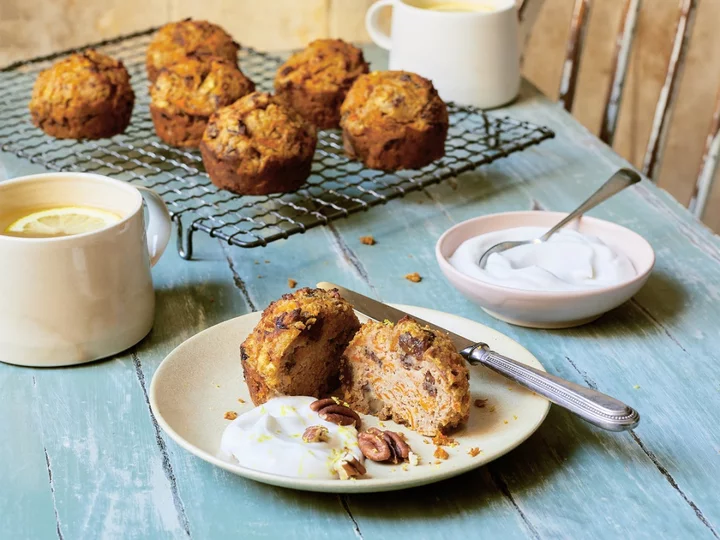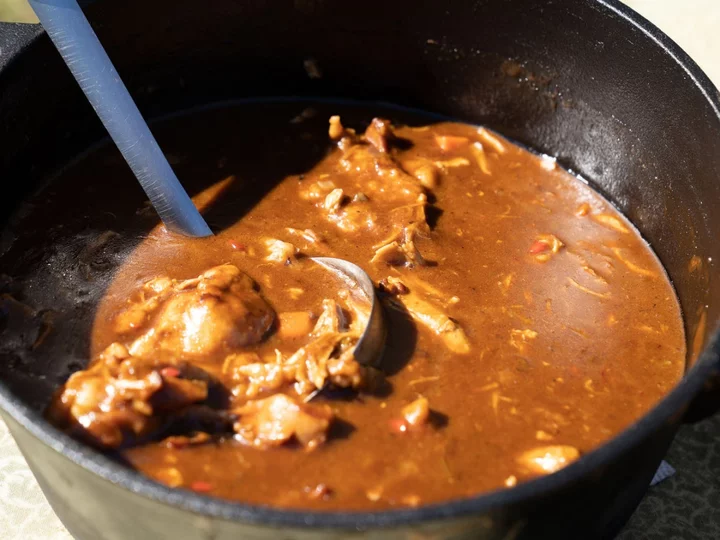As the weather warms up and the nights get longer, there’s nothing better than a light and colourful summery feast in the garden, balcony, doorstep or basically any perch in the sun you can find. And there’s few who do it quite as well as Angela Clutton, author of Borough Market: The Knowledge.
In her summer column for The Independent, she shares one of her all-time favourite salads: oregano-poached peaches, halloumi and hazelnuts. A mix of sweet and salty flavours, it’s simultaneously refreshing and completely beautiful on the plate.
What’s summer without tomatoes? Terrible, that’s what. Clutton says the best seasonal toms need little more than olive oil and salt to bring out their supreme flavour and the salad options are inexhaustible. But one not to be missed is her Nicoise “bundles”. The classic Nicoise elements of anchovy, mayonnaise, capers and egg are piled abord little gem boats for ease of eating.
Lastly, her labneh with watermelon, honey and mint is a recipe that straddles the boundary of sweet and savoury, perfect for those for whom dessert is not a priority. Her top tip is to always do more labneh than needed, as it’s such a useful thing to be able to reach for in the fridge.
Equipped with these recipes, you’ll be dining al fresco – or faking it indoors if it, ahem, rains – all summer long.
Oregano-poached peaches, halloumi and hazelnuts
There are fresh herbs, there are dried herbs, and then there are frankly incredible dried herbs. Into that last camp fall dried herbs that are produced to exceptionally high standards and don’t just harness the flavour of the starting point, but elevate it. Those are the only dried herbs really worth having in your store cupboard.
This recipe goes for poaching fresh peaches with dried oregano, which brings even more depth of flavour than fresh oregano would. Given the choice, I use one of the beautiful dried sprigs at Oliveology, but their ground oregano is lovely too. The poaching liquor is then reduced to a fragrantly sweet syrup for pouring over tender peach slices and fried halloumi, and finished with seasoned toasted nuts and mint. Perfect for a hot day.
Serves: 2 as a main, 4 as a side or small plate
Ingredients:
2 tsp dried oregano (or an Oliveology dried sprig)
1 tbsp honey
1 orange
2 peaches
40g skinned whole hazelnuts
1 tbsp fruity olive oil
6 sprigs of mint
225g halloumi
Method:
Pour 500ml water into a medium saucepan. Add the dried oregano (or oregano dried sprig), the honey and two broad strips of zest from the orange. Bring to the boil and, meanwhile, quarter and stone the peaches. Put them into the water, lower the heat to a simmer and sit a piece of baking paper on top. Simmer for 7-10 minutes until the peaches are fully tender. Use a slotted spoon to lift the peaches out and set aside. If their skins start to flake away as they cool, just peel them off.
Strain the poaching liquor, discard the oregano and orange peel, then pour the poaching liquor back into the saucepan. Don’t worry if a few pieces of oregano are left in the liquid. Boil over a high heat for 10-15 minutes to reduce to a syrup – you are aiming for about 75ml syrup.
While the poaching liquor reduces, toss the hazelnuts in the olive oil along with some salt flakes and freshly ground black pepper. Set a small dry frying pan over a low heat, then add the seasoned nuts and stir for 3 minutes or until they are just getting nicely toasted. Transfer to a bowl. Once they have cooled, roughly chop with the leaves from the mint sprigs. Cut the poached peach quarters into slices about 1cm thick.
Once the syrup is almost sufficiently reduced, cut the halloumi into 1cm-thick slices. Set the same frying pan the nuts cooked in back onto the heat, then add the halloumi pieces turning each over after 2 minutes or so once they are browned. You might need to do this in two batches.
Serve either on individual plates or on a large platter. Sit the halloumi on first, then arrange the peach slices prettily on top, scatter over the seasoned nut and mint mixture, and finish by spooning over your oregano-infused peach syrup.
Niçoise bundles
The classic niçoise salad is served here as individual bundles that are perfect for a summer lunch or starter. I’m giving you two versions: one layers up blitzed olives and capers with egg and an anchovy; for the other, flaked tuna sits on an olive bed with tarragon mayo.
Their simplicity makes it important that each ingredient is chosen for maximum flavour.
Perhaps especially the fish. I make these with (my favourite) Brindisa Ortiz anchovies and the same maker’s yellowfin tuna belly ‘ventresca, which in one bite of its long, tenderly rich hakes took me from thinking I didn’t really like tinned tuna to stockpiling it.
Serves: 4 as a main or 8 as a small plate or starter
Ingredients:
16 leaves of little gem lettuce and/or red chicory
For the tarragon mayonnaise:
1 egg yolk, at room temperature
1½ tsp moscatel wine vinegar
¼ tsp English mustard powder
100ml sunflower oil
50ml mild olive oil
1 sprig of tarragon
For the olive and tuna mix:
½ tsp raspberry vinegar
8 basil leaves
100g pitted black olives, drained weight
110g tinned yellowfin tuna
For the egg, olive and anchovy mix:
2 hen’s eggs or 4 quail’s eggs
150g pitted black olives
2 tsp capers
1 garlic clove
7ml peppery olive oil, plus 1 tbsp for drizzling ½ lemon 8 anchovy fillets
Method:
Wash and dry the lettuce or red chicory leaves.
For half of the little gem/chicory leaves:
Make the mayonnaise by gently hand-whisking the egg yolk with a pinch each of salt and ground pepper. Stir in the vinegar and the mustard powder, then hand-whisk in both the oils — drop by drop to start with, then in a steady, thin stream — until you have a lovely thick, shiny mayonnaise. Check the seasoning, chop the tarragon leaves and stir through.
Sprinkle a little raspberry vinegar, salt and pepper inside eight of the little gem / chicory leaves and line with a basil leaf. Chop the olives and sit them inside. Top with flaked tuna. Serve with the tarragon mayonnaise on top, or alongside to be spooned over.
For the other half of the leaves:
Hard-boil the 2 hen’s eggs (or 4 quail’s eggs) and set aside to cool.
Put the olives, drained capers, peeled garlic, 75ml of olive oil and a good squeeze of lemon juice in a blender and blitz to a paste.
Peel the hard-boiled eggs. Quarter them if hen’s, halve if quail’s. Spoon the oli relish inside the lettuce / chicory leaves, sit a piece of egg inside too and then over the top the whole anchovy fillet. Drizzle with the remaining olive oil.
Serve the bundles on platters for people to help themselves, or portion up two of each type per person.
Labneh with watermelon, honey and mint
I like to serve this as part of a medley of salads on a hot day. Or – noting that it is really on the cusp of savoury or sweet – lean into the sweetness and hold back a little on the salt: as a dessert it is especially appreciated by anyone without a super-sweet tooth.
Making your labneh is simplicity itself – it is, after all, just strained yoghurt – and a lovely thing to do, so long as you start at least six hours before wanting to eat it. Actually, every part of this recipe can be made ahead of time, chilled, then quickly assembled for serving at room temperature.
Serves: 6 as part of a sharing feast
Ingredients:
500g labneh made from 900g thick Greek yoghurt (see box)
About 800g watermelon
2 tbsp olive oil
½ orange
1 tsp wild sumac
2 tbsp wild thyme honey
Handful of mint
Method:
Spoon the labneh into a large serving bowl.
Trim the ends of the watermelon and cut the fruit into triangles about 1cm thick. Mix the olive oil with the juice from the orange, half the sumac and a good pinch of salt. Get a griddle pan (or barbecue) good and hot, brush the watermelon pieces with the dressing and sit the pieces in a single layer in the pan (or on the grill). If using a griddle pan you will probably need to do this in two batches. Turn them over after a couple of minutes, when nicely charred underneath. Let the other side char, then lift the slices out to cool.
Add any juices from the pan to your leftover oil, orange and sumac dressing. Whisk in the honey and the rest of the sumac. Add more salt.
Sit the watermelon pieces on the labneh and pour over the dressing. Chop the mint and scatter over, then finish with a grinding of black pepper.
You can visit Borough Market at 8 Southwark Street, London, SE1 1TL (020 7407 1002) or find more recipes online at boroughmarket.org.uk/recipes.
Read MoreThree quick and easy vegan fakeaway recipes
Budget Bites: Three light recipes that sing of summer
What the hell is Scandinavian food?
Lighter fish pie: Comfort food you won’t feel guilty for eating
How to make Norwegian potato pancakes
Rhubarb sticky buns for an idyllic Scandinavian afternoon tea









